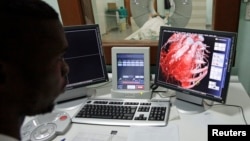U.S. scientists have created a “biological” pacemaker to keep the heart beating normally. The experimental technique may someday give cardiologists a new tool for treating patients with heart rhythm disorders.
Currently, surgeons implant electronic pacemakers to electrically stimulate the hearts of patients with heart block. These types of heart rhythm disorders cause the heart to beat slowly, can cause light-headedness, fatigue, fainting and in the worst cases, sudden death.
But there can be problems with pacemakers. Sometimes they malfunction. Also, patients occasionally develop an infection requiring the removal of the pacemaker for six to eight weeks of antibiotic treatment. And, occasionally, fetuses have heart block, which can result in stillbirth.
Researchers at Cedars-Sinai Heart Institute in Los Angeles, California, have developed a “biological” therapy that may someday replace pacemakers. Scientists created a natural pacemaker in experiments with pigs with a malfunctioning sinoatrial node, which regulates heartbeat.
They engineered a harmless virus to carry a gene called TBX18, then put it into a part of the heart the size of a peppercorn.
Lead researcher Edwardo Marban is director of the Cedars-Sinai Heart Institute.
“The TBX18 gene converts ordinary heart cells, of which there are billions in the human heart, into specialized sinoatrial node cells which number only in the thousands. In essence, we create a new sinoatrial node in a part of the heart that ordinary spreads the impulse but does not originate it," said Marban.
TBX18 plays a brief role in development of the sinoatrial node in developing fetuses.
The TBX18 infusion regulated the pigs’ heartbeats like a functioning sinoatrial node. The treatment lasted for two weeks, the length of the study.
In the United States, an estimated 300,000 heart patients receive pacemakers every year. About two percent of them develop infections. Researchers are initially targeting these individuals to receive the gene therapy. Investigators are planning human clinical trials. They eventually hope their work, which has been 20 years in the making, leads to a biological treatment for heart rhythm irregularities.
Nikhil Munshi is a cardiologist at University of Texas Southwestern Medical Center is Dallas.
Most of the time, Munshi says pacemakers work well and will probably continue to be the first line treatment for heart block. But he says having an alternative to the electronic device would be nice.
“In theory, at least, I think a strategy in which we can sort of reengineer nature may prove beneficial long term over electronic pacemakers, although electronic pacemakers are exceptionally helpful in treating many of these patients," said Munshi.
Munshi wrote an accompanying Perspectives piece in the journal Science Translational Medicine, where cardiologists from Cedars-Sinai Heart Institute report their work creating a "biological” pacemaker.




